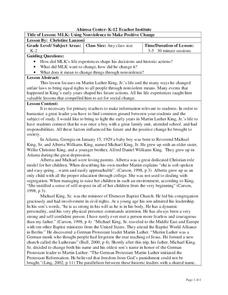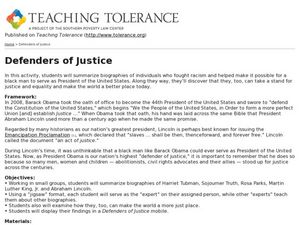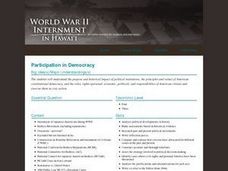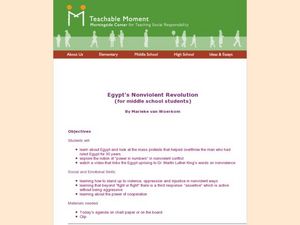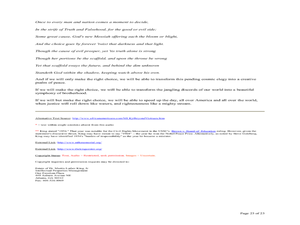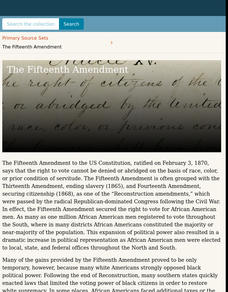Curated OER
Act of Sabotage?
Students examine animal cruelty laws in Great Britain. In this health instructional activity, students visit selected websites to research animal cruelty laws as they consider animal rights and hunting rights.
Curated OER
Just-Us and Kindness: A Voice for Children: King Day
Eighth graders investigate philanthropy. In this service learning lesson, 8th graders read human rights literature and use information gleaned to discuss children's rights around the world. Students discuss scenarios meant to prompt...
Curated OER
MLK: using Nonviolence to Make Positive Change
Young scholars read about Martin Luther King and discuss the rights and responsibilities of citizens. For this Martin Luther King lesson, students recognize the vocabulary words associated with freedom and nonviolence. Young...
Curated OER
How Does the USA Patriot Act Approach Race?
Students define and discuss the definitions of race and terrorism as a class. Using the Patriot Act, they analyze it and identify how it is a response to terrorism. They discuss how the documents could be viewed as one that supports...
Curated OER
Constitutional Issues: Civil Liberties During War
Learners discuss democratic ideals and constitutional principles. They decide which side of the issue they are on dealing with the placement of Japanese-Americans in camps during World War II. They examine primary source documents for...
Curated OER
Compliments can Change the World
Students explore the definition of philanthropy as it relates to bullying. In this moral values lesson plan, students listen to the book Thank you, Mr. Falker and identify how the main character was bullied. Students define philanthropy,...
Mississippi Whole School Initiative
Dream Big...With Your Eyes Wide Open
For many people, Barack Obama's presidency was the next step in Martin Luther King, Jr's dream of America's future. Explore the dreams of Americans past and present, as well as the young Americans in your class, with a set of activities...
Curated OER
Defenders of Justice
Students research abolitionists, civil rights advocates, and their allies to learn about racism and justice. In this racism and justice lesson, students define justice and sing a song about activism. Students review the biographies...
Curated OER
Participating in Democracy
Students analyze film clips in class. In this democracy lesson, students identify the differences between civil liberties, democracy and freedom. Students view a video regarding Japanese internment and answer study questions as well as...
Student Handouts
The Emancipation Proclamation
Start your class on the Emancipation Proclamation. The entire text of the Proclamation is included here along with two questions to answer. Space is provided to allow pupils to write their responses right on the page. Use this as a quick...
Facing History and Ourselves
The Audacity of a Vote: Susan B. Anthony’s Arrest
Susan B. Anthony's speech "Is It a Crime for Women to Vote?" takes center stage in a lesson that asks class members to consider how they might respond to what they consider an unjust law. Groups work through the speech paragraph by...
PBS
“He Named Me Malala”: Understanding Student Activism Through Film
Malala Yousafzai has become the face of social activism. After watching He Named Me Malala and short student-made films about what young people can do to become instruments of change, class members reflect on what it means to be an...
Curated OER
The ADA, the Supreme Court, and Self-Advocacy
Young scholars study the role the Supreme Court plays in laws and decisions that affect individuals with disabilities and examine the policies of the American with Disabilities Act. They draw parallels between policies enacted by the...
Curated OER
Egypt's Nonviolent Revolution
Middle schoolers explore the nonviolent protests of the Egyptians. In this current events lesson, students watch a video and read articles about the 2011 Egyptian uprising. Middle schoolers compare the Egyptian protest to the...
Curated OER
Muhammad Ali and his Vietnam War Resistance: Defining Nonviolent Action through Gandhi and King
Students research Muhammad Ali's act of civil disobedience. In this civil disobedience lesson, students research Ali's defiance of the Vietnam War draft and compare his reasoning to Martin Luther King's thoughts on the war. Students...
Curated OER
Common Good in Aztec Culture What Is Sacrifice?
Students examine contemporary examples of sacrifice while listing the reasons and benefits of these acts. They discuss the idea of when a sacrifice is a violation of human rights. They write a personal goal to make a small sacrifice.
Curated OER
Actors, Artists, Storytellers, and Poets
Twelfth graders in groups select a human rights issues and create a presentation that examines it through art, storytelling, poetry, or acting. The instructional activity helps students use different modalities of learning. Student...
Facing History and Ourselves
The Legacies of Reconstruction
The final lesson in the seven-resource Reconstruction Era collection examines the legacies of Reconstruction. Class members investigate why the period has been called an "unfinished revolution," "a splendid failure," and "the second...
Teaching for Change
Selma in Pictures: Socratic Seminar
Photographs from the freedom movement in Selma, Alabama serve as the basis of two Socratic Seminars. Class members prepare for the seminars by closely observing the images, form a hypothesis, and use evidence from photo to support a...
Digital Public Library of America
The Fifteenth Amendment
Fifteen primary sources provide a context for a study of the Fifteenth Amendment to the United States Constitution. The packet captures the excitement for the changes promised by the amendment as well as the backlash against it.
K20 LEARN
Oklahoma and Segregation
It was not just the states of the Deep South that practiced segregation. Young historians investigate the history of segregation and desegregation in Oklahoma. They begin by reading, annotating, and analyzing an article about the impacts...
PBS
Civic Engagement and How Students Can Get Involved
There is no age limit on civic engagement. Even if your pupils are not old enough to vote, they are old enough to get involved. Show them how with a PBS activity that underscores the importance of civic participation and models ways...
Teaching Tolerance
Using Photographs to Teach Social Justice | Legal Action: The Supreme Court
A social justice lesson focuses on the Supreme Court case Loving v. Virginia which struck down laws that prohibited marriages between African Americans and white Americans. The lesson begins with class members examining a photograph of...
Curated OER
Fox hunting debate
Students read the internet article "Hundreds of Hunts Out Despite Ban". The teacher then holds a class discussion about it. Students then hold a formal debate representing all points of view on the issues. Students then write a...
Other popular searches
- Civil Rights Act 1964
- Civil Rights Act of 1964
- Civil Rights Activism
- Civil Rights Act 2001
- Civil Rights Act Canada
- Civil Rights Act 1965
- Civil Rights Act 1866
- Civil Rights Act 1968
- Civil Rights Activists
- Civil Rights Act of 1866
- Jewish Civil Rights Activists
- Civil Rights Activities


